Increasing competition for a shrinking supply of local prospective students has led many colleges and universities to expand their recruitment targeting to the potentially lucrative international student market. Institutions seek the diverse perspectives that come with multiculturalism while ensuring that incoming international students have the necessary qualifications and financial resources that are the best fit for their school. The past decade has seen a sharp rise in student mobility alongside greater opportunities for schools to access these prospects independently and directly via internet channels. But how to reach them? Pay-per-click (PPC) marketing on search engines and social media platforms is proving to be an effective and cost efficient method for lead generation in foreign markets, but without the right preparation it’s easy to blow large sums of money with little return on investment.
For many, PPC advertising is the cornerstone of a solid digital marketing strategy, and marketers love it because you only incur expense when the target has expressed interest. Essentially, you bid on keywords relevant to your ad, which will then appear in sponsored links whenever a visitor enters one of these keywords. Even if nobody ever clicks your ads, the fact that they are popping up on the screen as a result of relevant search engine activity can mean millions of impressions and invaluable brand awareness. Students overseas are even more dependent on search engines to discover potential higher education institutions because they are less exposed to traditional channels, and are more likely to search something like “top Canadian university” rather than seek a particular location or school. PPC advertising is a great way to gain access to your most qualified prospects in diverse regions of the world since they are already actively seeking a place or program of study.
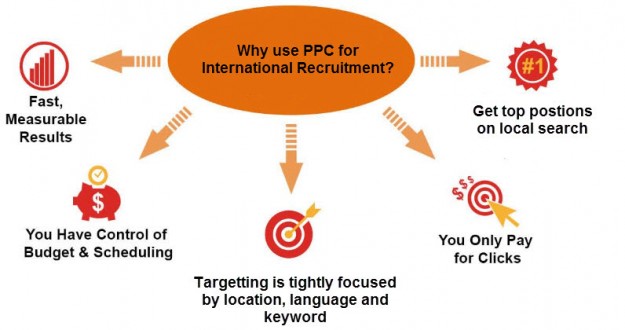
Why use PPC for International Recruitment?
The geo-targeting capabilities of PPC marketing for higher education means you can deliver finely crafted messages to highly targeted prospective students, tightly focused by location, language and keyword. Bidding strategy, budget and scheduling can be specifically nuanced to reach the leads most likely to convert. Paid ads on search engines are the most prominently displayed, and when combined with a strong organic SEO strategy it is possible to dominate the upper half of the first search results page for maximum visibility.
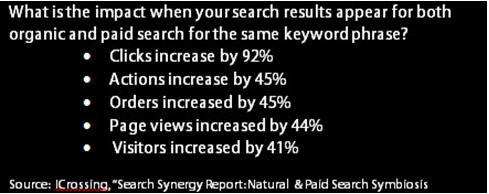
Another often overlooked benefit of PPC is keyword testing, as comparing the effectiveness of various keywords and messaging can be accomplished faster through PPC success metrics than with any other method. Keywords are the foundation of search advertising, ensuring your college is exposed to the right audience depending on what information they are actively seeking. You are likely very familiar with which keywords prospects are using to search your school domestically, but unique cultural and language considerations add an extra layer of complexity for international PPC.
Know your target market
Before even beginning keyword research, you should have a good idea of which markets to target, typical priorities and search behaviour for those students, and how visible and popular your brand is in each market. Consider whether your college already has a strong presence in a particular region and can leverage word-of-mouth referrals from current international students or alumni. Certain programs are often more popular in particular regions – for instance, in the vast nation of Russia, promote hospitality or engineering programs where those respective industries are the bigger local economic players. Tools like Google Trends can help identify searching patterns for web users around the world.
While ideal prospective students can come from anywhere in the world, it’s advisable to initially focus your efforts on one or two target markets and grow from there. Understand that PPC marketing can involve a long sales cycle and that visa processing times vary greatly by country, so manage expectations and ad placement timing accordingly.
It goes without saying that applying your North American messaging to worldwide campaigns isn’t likely to be your best bet, so take some time to research the cultural norms of your target market. Consider your relative brand strength, competition and user constraints. Even if you begin with a similar base strategy as your home market, translated to the local language, your PPC campaigns should become increasingly diverse and tailored as you gain more knowledge of search patterns and what does and doesn’t work.
Search engine preference
Although many consider PPC synonymous with Google AdWords, it should be noted that in many leading source countries, local search engines are far more popular than Google. Yandex in Russia, Baidu in China and Navar in South Korea all dominate their markets – there is a handy global search engine marketing guide here. PPC rules may vary significantly between search engines, including Bing and Yahoo. For example, to get on Baidu you’ll need a local presence with a Chinese domain website and a valid business certificate issued by the Chinese government, among other licenses.
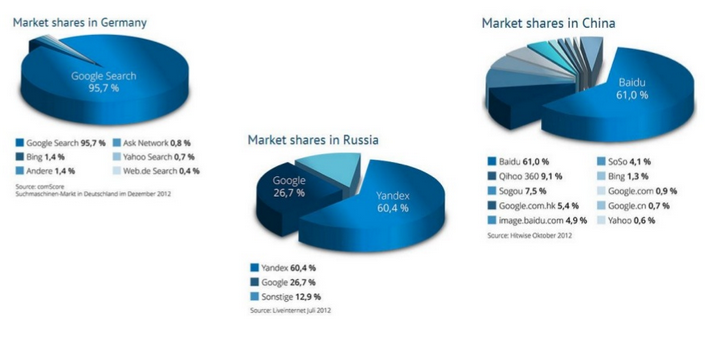
But PPC also extends beyond search engines. Text placements on Facebook, LinkedIn, and YouTube can also fall under PPC marketing and require individualized messaging that would appeal to each platform’s users. The rule of thumb is to target your prospective students on the websites they use, narrowing in on the postal codes where they live. The good news is that emerging markets tend to have lower keyword competition and so your budget should stretch farther.
Mobile PPC
Internet penetration is spreading at an incredible rate throughout the Middle East, Africa and Asia, and a majority of consumers in many of these countries are mobile-only. According to mobiThinking, 30 percent of the world’s mobile users are in top source countries India and China.
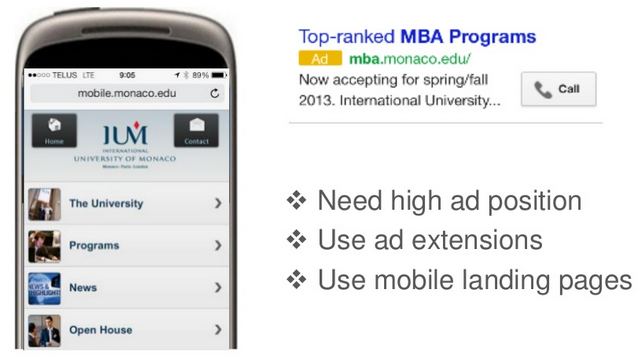
The Google network accounts for nearly 70 percent of global search traffic and is generally the most convenient method for geo-targeting diverse regions. Their enhanced ad campaigns featuring various Extensions greatly expanded in 2013, many of which are particularly useful for mobile.
Popular Ad Extensions include:
- images (of campus, happy students, etc.)
- reviews (student testimonials)
- drop-down navigation (to program pages, etc.)
- location (using Google Places and maps for locally targeted campaigns)
- social (link to your G+ page)
- communication (entering email for newsletter subscription or telephone call)
The Call feature is essential for mobile PPC to connect prospects already on their phones with direct access to a dedicated admissions line. There is much that could be said about specific mobile PPC best practices but result pages, keywords, competition and user intentions are all different on this platform. Be especially direct and concise, with large text and big buttons pointing to tailored calls-to-action like “Call Now.”
Keyword research
Effective PPC campaigns start with choosing the right keywords, which demands further research when going international. For best results, seek guidance from someone with real experience in that country, going beyond basic translation to understand cultural subtleties and up-to-date searching patterns. This can apply to ad copy and landing pages also. Google AdWords offers the free Keyword Planner tool for searching keyword and ad group ideas, finding historical statistics, creating new keyword lists and choosing competitive bids and budgets.
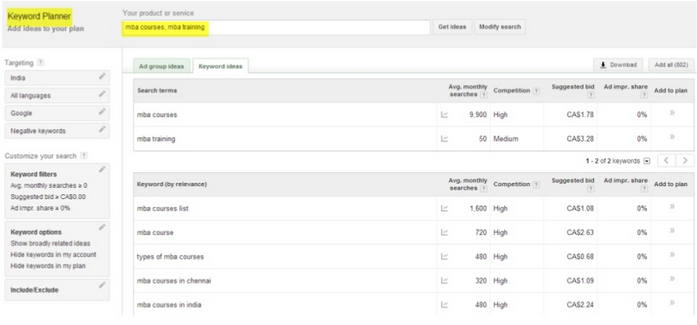
Identify phrases that are supportive to each other and the specific initiative. Competitor research is a start but as phrase competition is directly related to cost-per-click, consider more descriptive niche phrases that attract fewer overall searches but more highly targeted and qualified leads. Long tail keywords convert at higher rates but the key is to strategically research, identify and combine hundreds of long tail keyword phrases. Consider adding qualifying study terms, localizing place names, and keyword used by competitors.
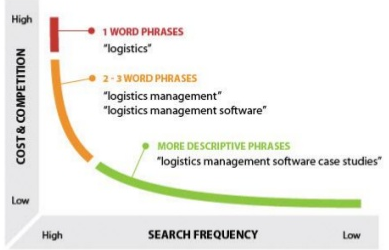
Connect ad messaging to landing pages
The essence of PPC messaging is “short and sweet” with punchy calls-to-action that attract attention and deliver qualified prospects to your targeted landing pages. Ensure that your landing pages are aligned with the PPC copy, optimizing content with these keywords and ideally integrating the most relevant keywords in content strategy and development for organic search success. Include your unique selling proposition, relevant benefits, at least one prominent call-to-action and a request for information form.
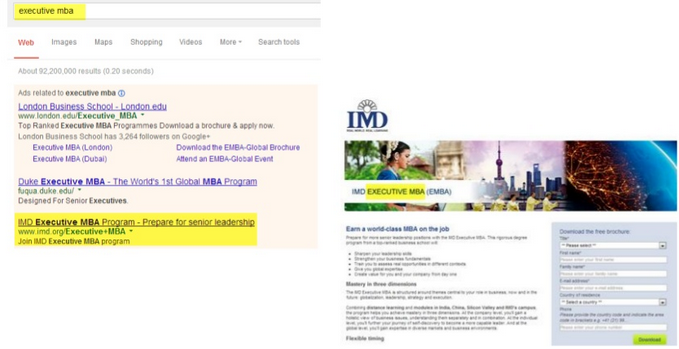
Always be testing
PPC marketing is a continuous work in progress that should naturally evolve as you determine the optimal keywords, messaging and markets. Campaigns are easy to start and terminate so don’t hesitate to regularly try out new strategies emphasizing seasonality or targeted programs. A/B testing with Google Analytics is a best practice to compare keyword and messaging options and to experiment with which time of day, week and year brings the highest return on investment. Monitor your paid search traffic and goal conversion rate by country and region. While disappointing results can sometimes be attributed to messaging shortcomings, it is also true that not all countries convert equally. Analytics results can lead to surprising insights that may lead you to significantly redistribute your marketing investments.
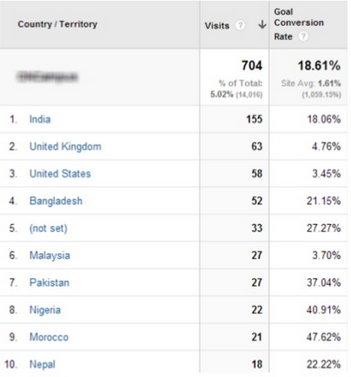
Technological advances are making the far corners of the world more accessible than ever but the dizzying array of options out there can be overwhelming. Proceed at a manageable pace by enlisting the services of digital marketers to wade into the international waters at a budget that suits your school. Integrate PPC into your marketing mix by gradually expanding and continuously improving your focus. PPC for international student recruitment is still under-utilized by colleges and universities, which can mean a competitive advantage for early adopters.
How has been your school’s ROI on international PPC?















